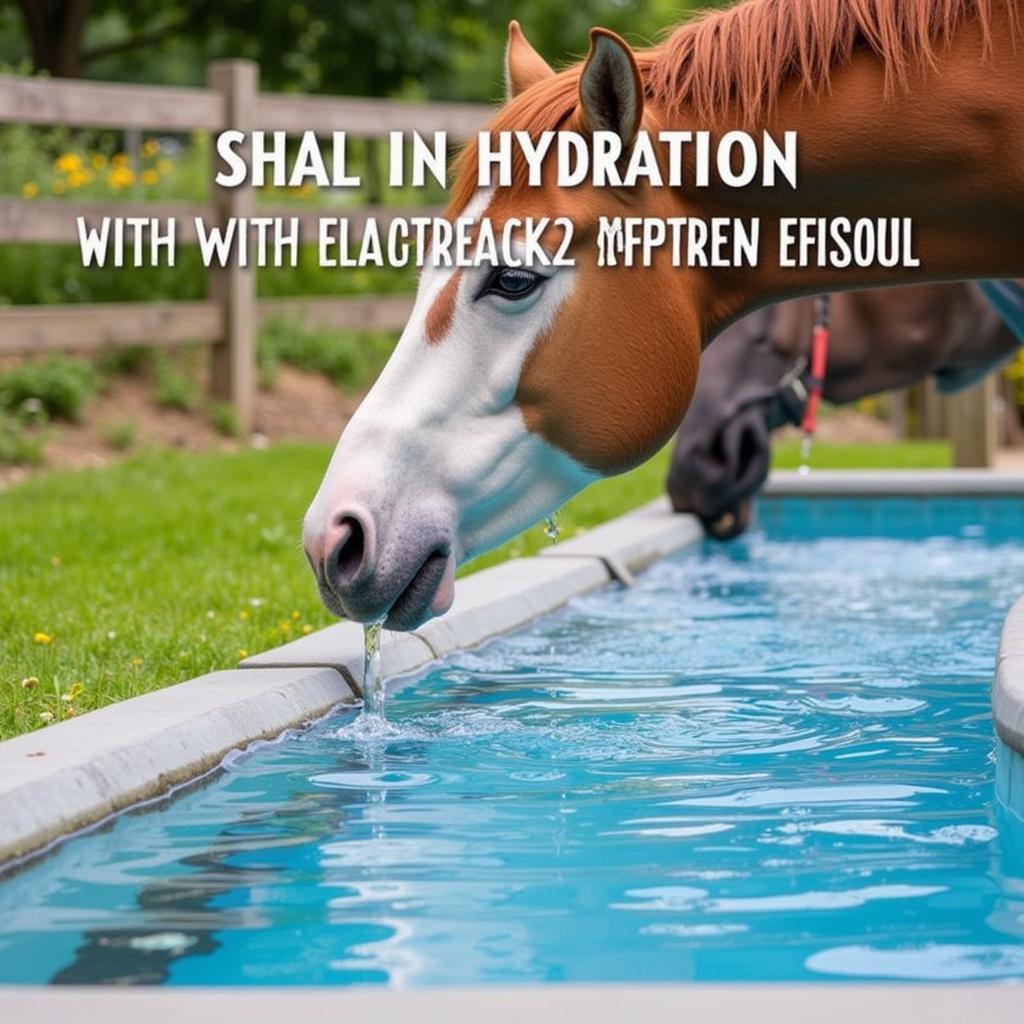Electrolytes for horses are crucial for maintaining optimal health and performance, especially during periods of intense exercise, hot weather, or illness. Understanding the importance of electrolytes, their different forms, and how to administer them correctly can significantly impact your horse’s well-being. This comprehensive guide will delve into everything you need to know about Electrolyte For Horses.
Why are Electrolytes Important for Horses?
Horses lose electrolytes through sweat, urine, and feces. These electrolytes, including sodium, chloride, potassium, calcium, and magnesium, play vital roles in various bodily functions, such as muscle contraction, nerve function, hydration, and acid-base balance. When electrolyte levels become depleted, it can lead to dehydration, muscle cramps, fatigue, poor performance, and even serious health issues.
 Horse Sweating and Electrolyte Loss
Horse Sweating and Electrolyte Loss
Choosing the Right Electrolyte for Horses
There are various types of electrolytes available for horses, each with its own advantages and disadvantages. Choosing the right one depends on your horse’s individual needs and circumstances. Some common forms include:
- Electrolyte pastes: These are convenient for single doses and are particularly useful for horses that are difficult to give oral supplements. Check out our guide on electrolyte paste for horses.
- Electrolyte powders: These can be mixed with water or feed and are a cost-effective option for long-term use. More information about electrolyte powders can be found on our electrolyte powder for horses page.
- Pelleted electrolytes: These are another convenient option, often mixed with feed, and offer a more palatable solution for picky eaters. Explore our selection of pelleted electrolytes for horses.
How to Administer Electrolytes to Horses
Proper administration is key to ensuring your horse receives the full benefits of electrolytes. Always follow the manufacturer’s instructions carefully. Over-supplementation can be just as harmful as deficiency.
Signs of Electrolyte Imbalance in Horses
Recognizing the signs of electrolyte imbalance is crucial for timely intervention. Common signs include:
- Excessive sweating
- Muscle fatigue and weakness
- Decreased performance
- Loss of appetite
- Lethargy
- Increased thirst
“Ensuring proper electrolyte balance is paramount for maintaining a horse’s overall health and athletic performance,” advises Dr. Sarah Miller, DVM, specializing in equine sports medicine. “Regular monitoring and appropriate supplementation are vital, especially in demanding conditions.”
 Horse Drinking Water for Electrolyte Replenishment
Horse Drinking Water for Electrolyte Replenishment
Apple a Day Electrolytes and Garlic Salt
Some horse owners opt for natural alternatives like apple a day electrolytes or utilize garlic salt as a supplement. Learn more about our apple a day electrolytes for horses and explore the benefits of garlic salt for horses.
“While natural options can be beneficial, it’s important to consult with a veterinarian to determine the appropriate dosage and ensure they meet your horse’s specific needs,” adds Dr. Miller.
Conclusion
Electrolyte for horses is not just a supplement; it’s an essential component of their overall health and well-being. Understanding the importance of electrolytes, choosing the right type, and administering them correctly can help keep your horse performing at its best. Remember to always consult with your veterinarian for personalized advice on electrolyte supplementation for your horse.
FAQ
- When should I give my horse electrolytes? After strenuous exercise, during hot weather, or when your horse is showing signs of dehydration or electrolyte imbalance.
- Can I give my horse too many electrolytes? Yes, over-supplementation can be harmful. Always follow the manufacturer’s instructions.
- What are the signs of electrolyte deficiency in horses? Excessive sweating, muscle weakness, fatigue, decreased performance, and loss of appetite.
- How are electrolytes administered? Electrolytes can be administered in various forms, including pastes, powders, and pellets, typically mixed with water or feed.
- What are some natural electrolyte sources for horses? Apples and salt can provide some electrolytes, but they may not be sufficient for horses with high electrolyte needs.
Please contact us for any further assistance. Phone: 0772127271, Email: [email protected]. Our address is QGM2+WX2, Vị Trung, Vị Thuỷ, Hậu Giang, Việt Nam. We have a 24/7 customer service team.